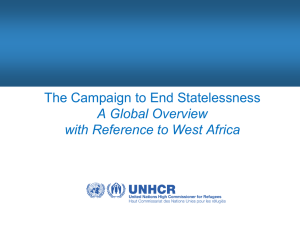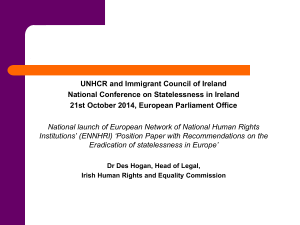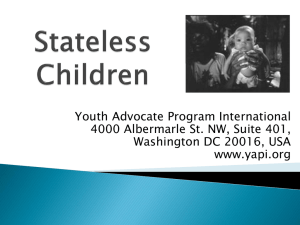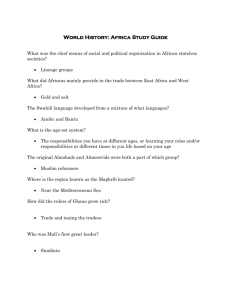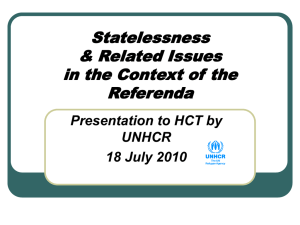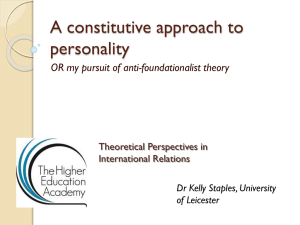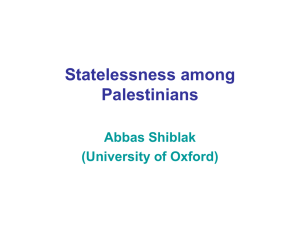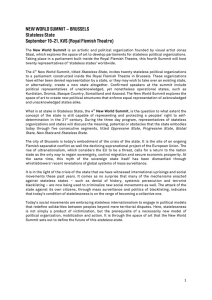English
advertisement
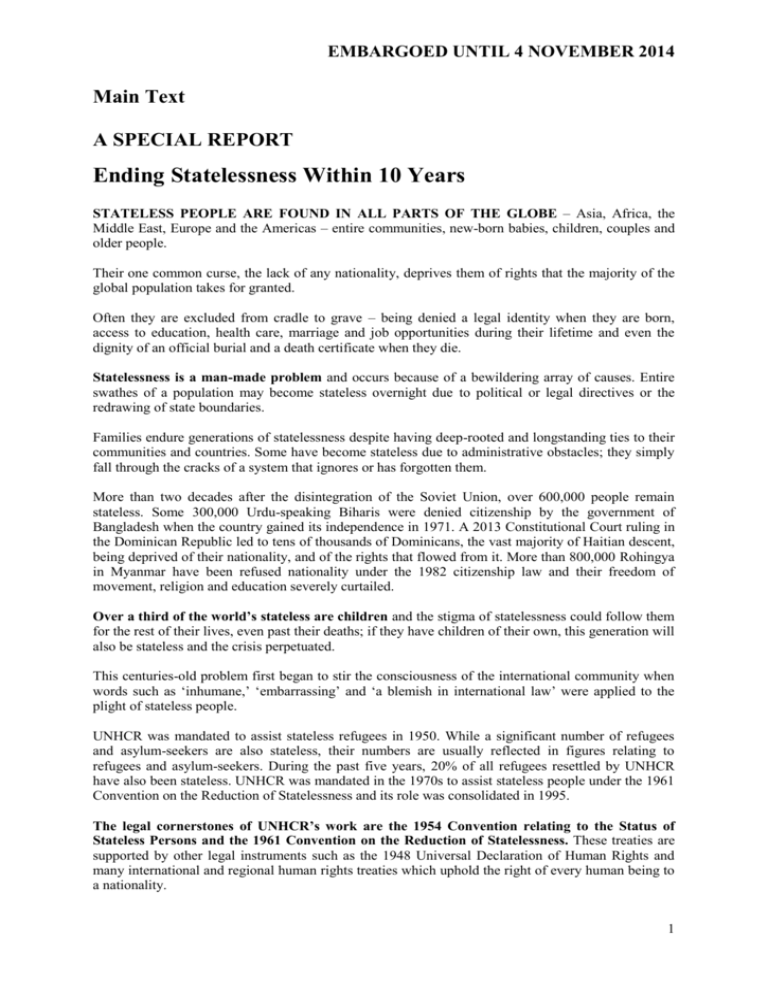
EMBARGOED UNTIL 4 NOVEMBER 2014 Main Text A SPECIAL REPORT Ending Statelessness Within 10 Years STATELESS PEOPLE ARE FOUND IN ALL PARTS OF THE GLOBE – Asia, Africa, the Middle East, Europe and the Americas – entire communities, new-born babies, children, couples and older people. Their one common curse, the lack of any nationality, deprives them of rights that the majority of the global population takes for granted. Often they are excluded from cradle to grave – being denied a legal identity when they are born, access to education, health care, marriage and job opportunities during their lifetime and even the dignity of an official burial and a death certificate when they die. Statelessness is a man-made problem and occurs because of a bewildering array of causes. Entire swathes of a population may become stateless overnight due to political or legal directives or the redrawing of state boundaries. Families endure generations of statelessness despite having deep-rooted and longstanding ties to their communities and countries. Some have become stateless due to administrative obstacles; they simply fall through the cracks of a system that ignores or has forgotten them. More than two decades after the disintegration of the Soviet Union, over 600,000 people remain stateless. Some 300,000 Urdu-speaking Biharis were denied citizenship by the government of Bangladesh when the country gained its independence in 1971. A 2013 Constitutional Court ruling in the Dominican Republic led to tens of thousands of Dominicans, the vast majority of Haitian descent, being deprived of their nationality, and of the rights that flowed from it. More than 800,000 Rohingya in Myanmar have been refused nationality under the 1982 citizenship law and their freedom of movement, religion and education severely curtailed. Over a third of the world’s stateless are children and the stigma of statelessness could follow them for the rest of their lives, even past their deaths; if they have children of their own, this generation will also be stateless and the crisis perpetuated. This centuries-old problem first began to stir the consciousness of the international community when words such as ‘inhumane,’ ‘embarrassing’ and ‘a blemish in international law’ were applied to the plight of stateless people. UNHCR was mandated to assist stateless refugees in 1950. While a significant number of refugees and asylum-seekers are also stateless, their numbers are usually reflected in figures relating to refugees and asylum-seekers. During the past five years, 20% of all refugees resettled by UNHCR have also been stateless. UNHCR was mandated in the 1970s to assist stateless people under the 1961 Convention on the Reduction of Statelessness and its role was consolidated in 1995. The legal cornerstones of UNHCR’s work are the 1954 Convention relating to the Status of Stateless Persons and the 1961 Convention on the Reduction of Statelessness. These treaties are supported by other legal instruments such as the 1948 Universal Declaration of Human Rights and many international and regional human rights treaties which uphold the right of every human being to a nationality. 1 EMBARGOED UNTIL 4 NOVEMBER 2014 But for decades solving statelessness appeared to be insurmountable. Many governments and the international community as a whole appeared uninterested, often prolonging crises rather than undertaking efforts to solve them. UNHCR insists that this problem is largely avoidable, and with adequate political will, entirely solvable too. A major hurdle to solutions is that governments and UNHCR lack adequate data on many stateless populations. Frequently stateless persons are not only undocumented but also ignored by the authorities and uncounted in national administrative registries and databases. Most even go uncounted in population censuses. Of 142 national population censuses undertaken since 2005, for which the United Nations possesses detailed information, only 112 included a question on nationality. Of these, less than 25% of census questionnaires included pre-set options for census takers to fill in “stateless” or “without nationality” when interviewing stateless individuals. In recent years there has been a perceptible and positive shift to resolve statelessness. More states have acceded to the two conventions; 26 states have become parties in the last three years alone bringing the total up to 82 countries which have acceded to the 1954 Convention and 60 countries which have acceded to the 1961 Convention. Many have resolved statelessness. Following a 2008 High Court ruling in Bangladesh the 300,000 stateless Urdu-speakers were recognized as citizens. Viet Nam has moved to resolve the plight of stateless former refugees from Cambodia and to facilitate the re-acquisition of nationality by thousands of women who became stateless after they failed to acquire the nationality of foreign husbands. Since 2009 more than 60,000 former Soviet citizens have become nationals in Kyrgyzstan, while over 15,000 have acquired the nationality of Turkmenistan. In Iraq, during Saddam Hussein’s regime, a 1980 decree stripped Faili Kurds of citizenship until the new government overturned that decision. Côte d’Ivoire amended its laws in 2013 to allow nationality to be acquired through a simplified application process that will allow many of the 700,000 stateless persons there to acquire citizenship. There also have been inspiring individual success stories. Through sheer perseverance, Srinuan, a young stateless woman, fought to get Thai nationality and subsequently inspired hundreds of people from her village to follow suit. Halfway across the globe in Côte d’Ivoire, stateless person, Bere Tassoumane, acquired nationality and was then able to run for local office in the city of Bouaffle, and five more of his formerly stateless friends subsequently won local elections. “We are working for the well-being of our community out of love because we ourselves were marginalized,” Tassoumane says. Building on this momentum, UNHCR is launching its Campaign to End Statelessness within 10 years. UNHCR’s strategy to achieve the ambitious goal of this campaign sets out key actions that states must take to address statelessness. These actions include: Resolving major situations of statelessness through law and policy reforms, accompanied by citizenship campaigns; Ensuring that no child is born stateless; Preventing deprivation of nationality on the basis of discrimination; Removing gender discrimination in nationality laws; Granting protection status to stateless migrants; and Issuing nationality identification documentation to those with entitlements to it. 2 EMBARGOED UNTIL 4 NOVEMBER 2014 In prioritizing the eradication of statelessness, United Nations High Commissioner for Refugees António Guterres said: “It is tragic that today millions of people are living without nationality. Unlike many armed conflicts, it is wholly within the power of every concerned government to resolve statelessness. We have the opportunity, as never before, to tackle this injustice. Now is the time to act. I reiterate to governments that UNHCR is committed to supporting your efforts to end statelessness.” Children: Millions of ‘Invisible’ Kids OVER A THIRD OF THE WORLD’S STATELESS PEOPLE ARE CHILDREN. Many fall into a legal quicksand the day they are born, spend most of their lives battling the inequalities they inherited, and often pass on their heartbreak on to future generations. It may not even be possible to register the birth of a stateless child, making that infant an instant ‘nonperson’ in the eyes of governments. He or she is subject to potential abuse and rejection ranging from lack of access to life-saving immunizations to protection from early marriage. After being required to present his grandfather’s death certificate to confirm his nationality, Hussain, a young Kenyan asks, “Can you imagine someone asking you for something you don’t have? Asking you to give some proof when you don’t really know how to prove it. When my grandfather died I wasn’t even born.” The risk of unregistered children being left stateless increases when conflict forces them to flee their homes or when they are born in exile. Over 50,000 children have been born to Syrian refugee parents in Jordan, Iraq, Lebanon, Turkey and Egypt since onset of the conflict. Most are entitled to the nationality of Syria but those who remain without civil birth registration may face serious problems proving this later in life. But registration is not always an easy procedure for refugees. Due to the conflict, many refugees have lost the identity documents which are required in order to register the births of refugee children in the country of asylum. Challenges also arise in relation to registering children born out of wedlock or to parents whose religious marriages have not been formally registered. In Lebanon, UNHCR found that 78% of new births surveyed since their arrival to Lebanon were not registered with the national authorities by Syrian refugees. Further research is underway to assess the scale of the issue in the other main countries of asylum. UNHCR continues to work with national authorities to simplify the requirements for registration, and to make civil registration of marriages and births more accessible to refugees. It has also undertaken a mass awareness-raising campaign in coordination with UNICEF and other partners to explain procedures to refugees, including through brochures and instructional videos shown at help desks, camps and registration points. EDUCATION: A BASIC HUMAN RIGHT DENIED? Education is a particularly thorny issue. Stateless children can be refused permission to enter public schools, denied higher education and stigmatized by teachers and other pupils alike. “What affects me most is that I cannot declare my children,” says Juliana in the Dominican Republic. “The school asks for the documents of my children,” documents Juliana does not have. “I want my children to study, to get ahead, something I didn’t do,” but without those vital pieces of paper her children and many others may not be able to even attempt living a normal life. “I missed out on getting a scholarship to study in Japan because I had no ID card, no nationality,” says Sheila, who grew up stateless in Viet Nam. 3 EMBARGOED UNTIL 4 NOVEMBER 2014 Shaming and threats are sometimes employed. “The teachers enter the classroom and tell those who don’t have IDs to raise their hands,” one girl in the Dominican Republic recalls. “Then those who have IDs tease those of us who don’t. They say ‘the trucks are coming to deport you. You cannot take your exams. You are wasting your time. You are not going to get anywhere with your life.’” In Myanmar, only 4.8% of stateless girls and 16.8% of stateless boys complete primary education, compared to 40.9% and 46.2% of other boys and girls. Children sometimes beat the odds and the result can be spectacular. Undaunted, many stateless children have gone on to achieve great things. Srinuan has a remarkable story. Facing challenges in completing education, she persevered and graduated from school with the support of a local foundation. She continued to pursue her education and won a full scholarship to study at a university in the United States where she was shocked that people “treated me like an equal. Even if I told them I was stateless they still wanted to be friends.” “I could travel freely,” she continues. “I was not the same person that I was in Thailand. I would think ‘Why can’t I feel the same way in my home country?’” But when she did return home “to renew my travel documents I felt like my struggle was beginning all over again.” Empowered by her education, she eventually returned to live in Thailand where she successfully fought to obtain Thai nationality. Her success encouraged others in her village to follow her example. UNHCR’s Campaign is aimed at resolving the statelessness which results in the kind of hardship faced by thousands of children, like Srinuan, today. Families: Under Constant Pressure THE LACK OF NATIONALITY CAN DISTORT AND OFTEN DESTROY the basic human partnership – the family. Statelessness discourages young people from marrying in the first place and from having children, even if they do form a partnership. The pressures of being officially ‘invisible’ can destroy the family unit through physical separation or legal quagmires. The administrative nightmare may last for generations, continuing the cycle of degradation and hopelessness. Kosala, a young stateless man in Viet Nam wanted to get married but “my girlfriend’s parents asked ‘Who are you?’ I had no documents, no ID, no nationality. I couldn’t even get a marriage certificate from the authorities.” IMPOSSIBLE DECISIONS Knowing they would pass their statelessness on to their children, one stateless couple told UNHCR they had decided not to start a family because they could not face cursing their children with the same deprivation and despair of statelessness. “I feel bad when I see others with babies, because I cannot have a baby,” the wife says. “Every married couple wants to have children.” In Madagascar, Elina reiterates that heartache. “I really want to start having children. I have been married long enough. But I won’t until I get my nationality.” 4 EMBARGOED UNTIL 4 NOVEMBER 2014 In Belgium, Gabir, a stateless man from the Middle East, cannot marry his girlfriend who is a European Union citizen because he is stateless and lacks the necessary identity papers. He also cannot even officially acknowledge the paternity of their child. Legal headaches are magnified. The stateless often face insoluble problems over property rights or the custody of children following the death of a spouse or separation. They are at risk of arrest or detention each day because they lack an official ID. They live in constant fear of being expelled from a country or sometimes resort to fleeing and split up their families in a desperate attempt to resolve their children’s statelessness. Gender discrimination is particularly insidious. Twenty-seven countries today still prevent women from passing on their nationality to children on an equal basis as men. Nabila, a Syrian mother, worries about her stateless daughter who was unable to acquire her father’s nationality before her parents divorced. She despairs, “Although my daughter has a good degree from Damascus University, without citizenship or identification papers, she cannot accept the many job offers and travel opportunities she receives. She is only 25 years old, but her future is bleak.” Families’ plight can sometimes result in dreadful choices. Some couples seek divorce, in part because it is one of the few decisions they have full control over and in part because divorce is one of the few means of exiting the cycle of despair. Archaic nationality rules in some countries mean divorce may offer an avenue for the children of a stateless father and a national mother to acquire her nationality. These children may now gain nationality, but at the cost of a broken family. Saida in Morocco was unable to pass on her own nationality to her children because she is a woman. Without nationality, her family had no right to residence and when the children reached maturity they faced the problem of leaving the country every three months to attain a visa and trying to return. Thankfully, the law was amended in 2007 changing the lives of thousands of children for the better, including Saida’s. Morocco is one of 12 countries that have reformed their nationality laws during the past decade allowing mothers to confer their nationality to their children in the same way fathers can – an encouraging development. Everyday Life: Frustration and Humiliation THE ROADBLOCKS CHILDREN FIRST encounter at school follow them throughout their lives, making it difficult and sometimes impossible for them to receive medical attention, obtain a job or enjoy other social services. Issa highlights the frustration of being a ‘non person’ in Kenya. Emphatically, he explains, “You cannot leave your house.” Technically, to do so without an ID is a crime. “Now, if you cannot leave your house, how do you live? How do you look for a job?” he asks. “You can’t open a bank account. You can’t transact business. You cannot own anything because you don’t exist.” Railya was a university professor with numerous publications to her name, but as a stateless person in France she found it impossible to find employment or acceptance. “The totally blank expressions on people’s faces. That kills you,” she says. OFF LIMITS In countries across the globe many jobs are off limits or severely restricted for non-nationals, including public service, teaching, law, medicine and engineering. Some stateless people may be blocked from the labour market altogether. 5 EMBARGOED UNTIL 4 NOVEMBER 2014 Even if they can find work, stateless people often have to accept wages substantially lower than nationals, little chance of promotion and the expectation of dismissal at any moment. “My salary is nothing more than pocket money,” says Aldulrahman, who lives in Kuwait. Because of such situations, stateless people face greater everyday pressures than other groups. In Myanmar, for example, nationals normally use state hospitals and clinics. However, because of government rules, stateless people have to resort to private clinics – which are much more expensive – or rely on non-profit organizations. This pattern is repeated in other countries. In Kenya, the government issued free mosquito nets, but only households with official IDs were eligible. “Does malaria only attack Kenyans?” one frustrated stateless person asked at the time. There are occasional breakthroughs, but rarely without a twist in the tail. Sleiman is not authorized to work because he is stateless, but he nevertheless runs a successful wrought iron business in Lebanon. His company is registered in the name of his wife, who is a Lebanese national. Sleiman is also a successful rally car driver and to recognize his sporting achievements, a cedar tree was officially planted in his honour. But despite his many attempts to be recognized as a Lebanese national, he remains unable to represent Lebanon at international sports events and is still stateless. His pain and frustration is apparent when he says: “I am nearly 50 years old and I am tired of begging.” Participation: Coming In from the Cold STATELESS PEOPLE WANT NOTHING MORE THAN TO COME IN FROM the cold – to belong. But this is often impossible. They have few rights in either their social or professional lives and are often voiceless and politically impotent in communities where most have lived for many years. A woman in Brunei Darussalam expresses how helpless she felt: “Even if I do voice my opinion, I don’t think by my own voice it would matter.” And yet the ‘pull’ of the local community and state is strong even among these excluded people. A majority of stateless persons in Estonia said in a series of interviews that they viewed that country as home and wanted nothing more than to actively participate in the full political process. Exceptionally among stateless populations worldwide, stateless people in Estonia can vote in local elections but they still cannot stand as candidates, participate in national referenda or parliamentary elections or join a political party. As Railya in France eloquently articulates, there is nothing quite as hopeful, or in some cases as elusive, as feeling at home. “In Russian, there is a plant with no roots, perakati pole (tumbleweed). It tumbles. It rolls away with the breeze. That is statelessness. And me, I want to put down my roots.” 6 EMBARGOED UNTIL 4 NOVEMBER 2014 NO VOICE The mood has changed in certain countries and in some situations stateless people are beginning to gain a tentative social foothold, often aided by stateless and local advocacy groups. In one case, filed by the Urdu-speaking Peoples Youth Rehabilitation Movement, the Bangladesh High Court in 2008 ruled that members of an Urdu-speaking minority which had been stateless since independence, were, in fact, nationals: “By keeping the question of citizenship unresolved on wrong assumptions over the decades, this nation has not gained anything – but rather was deprived of the contribution they could have made in nation building,” the court observed. A grassroots movement, Stateless Young Brazilians, Brasileirinhos Apatridas, rallied expatriates and their children to successfully push for a 2007 amendment to a constitutional provision which had required children born of Brazilian parents outside the country to return home to live before they could be granted nationality. That requirement often resulted in children becoming stateless. It’s estimated that as many as 200,000 children were able to acquire Brazilian nationality as a result of the reform. Stateless groups in Mauritania and Kenya have used human rights mechanisms to lodge complaints at the international level. Elsewhere, groups employed petitions, public demonstrations and social media to demand a solution to their plight. J.S. is another example of a stateless person who desperately wants and needs his voice to be heard. He is of Malawian origin but was born and lived in Zimbabwe until he was 10 years old. He then traveled to South Africa with his mother before being abandoned by her. He attempted to obtain Zimbabwean documentation, even travelling back to Zimbabwe to pursue the necessary paperwork, but to no avail. He was unable to legally marry his companion, because he was undocumented and, he worries that his child might be stateless and voiceless also. “My dream is to have a document so that I can vote. I want the government to see me and to recognize my problem and to listen.” “Me, now I’m old, but now I’m looking to the dreams of my child. I want him to have a future.” Although there is already a community of UN, NGO and local actors working to resolve statelessness, a key component of UNHCR’s Campaign to End Statelessness is to foster greater partnership between the agency, governments, other international organisations, civil society and stateless groups to form a ‘global coalition’ and increase their collaboration to fight statelessness. Security: Living Under Constant Threat STATELESSNESS CAN SPARK inter-communal strife or even civil conflict – but resolution of statelessness can also provide a new start. People become condemned in an unending cycle of repeated imprisonment or remain trapped in their own homes for years. There is an ever-present feeling of potential betrayal, even by friends and relatives, true in the world’s most developed countries as well as in chronically unstable regions. Hundreds of thousands of stateless people live in the West African state of Côte d’Ivoire and when civil war broke out there in 2002, it was fuelled by disputes over Ivorian identity and nationality. Refugee communities across the globe often include stateless people forced to flee their already precarious positions, imposing additional strains on local communities and states. 7 EMBARGOED UNTIL 4 NOVEMBER 2014 Stateless people often live in a constant state of siege. “I am afraid to go out,” Gabir in Belgium says. “Everywhere I go I am afraid that someone will ask for my identity card.” Um Chadi, a mother of three stateless sons in the Middle East, has had to rescue her son from jail several times after he has been picked up en route to his early morning job. “At 2 a.m. in the morning. Once at 3 a.m. as well, I went to the police station to pick him up. Is that a life? Honestly, it’s not a life.” Stateless people from Myanmar living in Bangladesh became entangled in a vicious cycle of continuous imprisonment for years. Released after initial immigration or criminal sentences, they were immediately re-imprisoned because the authorities were unable to deport them to Myanmar where they were ‘non-persons.’ They acquired their own nickname, ‘the released prisoners,’ and even gained the sympathy of other inmates. NO BOUNDARIES The stigma of statelessness recognizes no boundaries. Stateless people are often treated as irregular immigrants, and in Britain one third of stateless persons interviewed for a 2011 study said that they had been detained at one time or another for a period of a few days to five years under the country’s immigration powers. “Once I was not allowed to enter my younger daughter’s school since I was not able to produce an ID,” recalls a woman in Sri Lanka who has since acquired nationality under ground breaking reforms there. “I avoided going to town during conflict times because I did not have an identity card, fearing the possibility of arrest by the police.” As stateless people often lack both nationality and necessary identity documentation, they are vulnerable to arrest or detention, forcible eviction, expulsion and even trafficking. One stateless woman in Thailand recalls, “Businessmen came to look for young girls. These men were human traffickers. I saw some stateless girls go and work as prostitutes.” Insecurity is insidious, always present and invading even the most intimate of relationships. People without papers often cannot own anything. “I have registered my car in my brother-in-law’s name,” one man in the Gulf says. “I like him. I think he is a good guy. However, I keep telling my sister to say good things about me to him. I don’t want him to be angry. I could be left with nothing.” The wheels of justice do work for some. In Thailand, the dispossessed often turn to community leaders for assistance. And there have been a string of recent successes in European, African and inter-American regional courts to resolve human rights complaints on statelessness. Seeking Solutions THE PROBLEM OF MARGINALIZATION HAS PERSISTED FOR CENTURIES. The world’s 10 million stateless live a marginalized, invisible existence. Their lives have been disrupted or destroyed with incalculable social, economic or political consequences. The nightmare continues today – the woman who weeps that “it is better not to exist than to be without identity papers”; the youngster in the Dominican Republic denied an escape from poverty and an attractive career as a baseball player; and the woman in Madagascar who refuses to start a family until she gets citizenship. 8 EMBARGOED UNTIL 4 NOVEMBER 2014 But there are also individual and national beacons of hope: the Thai woman who, having gained her own nationality is helping other stateless people acquire their own; the Ivorian man now actively involved in local politics; the recognition by the Bangladesh High Court of the citizenship of the Urdu-speaking minority; and the granting of nationality to over 60,000 people in Kyrgyzstan. UNHCR’s 10-year Campaign to End Statelessness will harness a unique window of opportunity to garner public, national and international support to finally eradicate the scourge of statelessness within a decade. Statelessness created during a single moment in history can go on to affect people for generations and unless action is taken, these disenfranchised populations will continue to grow. Statelessness, however, can be resolved in a single moment, too. The key factor to a solution is political will; then relatively simple and low-cost reforms that can have an immediate, permanent impact. During the past five years, UNHCR has quintupled its budget for resolving statelessness and a special mechanism created by High Commissioner Guterres will provide increased funds for particularly promising and important projects. The Executive Committee of the High Commissioner’s Programme has approved a budget of US$68 million for 2015. In addition to the agency’s own global staff network of aid workers who care for and protect the world’s displaced and stateless people, over 20 additional specialists have been deployed around the world to work with governments and other relevant organizations to address statelessness. The Campaign to End Statelessness aims to fully resolve existing situations of statelessness and prevent new cases of statelessness during the next 10 years. Persuading and supporting states to undertake several key actions could sever the vicious cycle of statelessness that affects millions of people globally. The actions include: Ensuring that every birth is registered, thereby helping to establish legal proof of parentage and place of birth – key elements of proof necessary to establish a nationality. Ensuring that all children are granted nationality if they would otherwise be stateless for example, if their own parents are already stateless. Removing gender discrimination from nationality laws so that women can pass on their nationality to their children on an equal basis as men. Where fathers are stateless or unable or unwilling to take steps to pass on their nationality, gender parity in nationality could prevent childhood statelessness in thousands of cases. Resolving current situations of statelessness through changes to legislation or government policy which in most cases is the simplest, most low-cost approach to address statelessness. Eliminating discrimination because of race, ethnicity, religion, gender or disability which is sometimes enshrined in law and has affected hundreds of thousands of members of minority groups across the world. Other measures, which will be highlighted in discussions with governments and relevant international and regional organizations, public and academic conferences, include guarantees of a nationality to individuals affected by the creation of a new state or the transfer of territories between states; encouraging all countries to accede to the two UN conventions on statelessness; ensuring that stateless migrants acquire a legal status and a nationality through government procedures; and the gathering of more comprehensive data on stateless people and the causes of their statelessness. 9 EMBARGOED UNTIL 4 NOVEMBER 2014 “Ending decades of social injustice ingrained in the everyday life will not be easy but it is simply the right thing to do,” High Commissioner Guterres said. “Stateless people almost always have strong ties to one country or another. With political will and our combined efforts, those ties between people and states can be recognized. Millions of people will finally have a country to call their own and will finally have the same opportunities enjoyed by the rest of us.” DER, 30 September 2014 10
